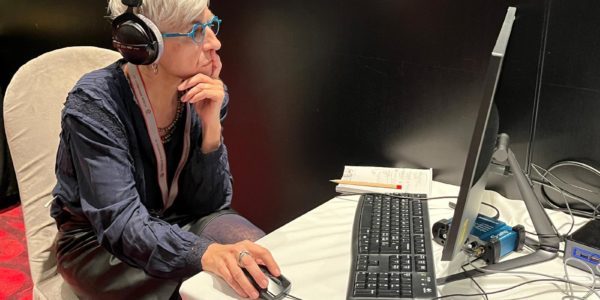A Wikipedian in Residence doesn’t necessarily just work in museums. In archives, too, volunteers from the wiki community are helping to make content on wiki platforms available to the world. Ursina Gabriela Rösch is one of them. She spent a month at the Montreux Jazz Archive at the EPFL in Lausanne helping to update Wikidata – a collaboration that came about as a follow-up to the GLAM on Tour event in Montreux in November 2022.
Hello Ursina, thank you for giving us an insight here. What motivated you to sacrifice your free time for a project like this?
Ursina: Every event is influenced by a few events that come before it. I met Sandra Becker, head of the Wikimedia CH GLAM programme, when she took part in ‘my project’ at the FATart Art Fair in Schaffhausen as an artist.
In autumn 2022, I felt the desire to get more involved with music, and also that the French language should play a more important role in my life again. Shortly after, I met Sandra Becker again and was invited to GLAM-on-Tour in Montreux.
Of course I accepted immediately, and so I stumbled into the wiki world and the world of the Montreux Jazz Festival. Alain Dufaux, Operations & Development Director EPFL – Cultural Heritage & Innovation Center, the cooperation partner at this GLAM-on-Tour, then invited me to the 56th festival as a mediator. Because this opportunity was too tempting, the question of payment took a back seat; the events are more important to me. It was like in jazz: improvisation, the groove – there are also rhythms and sounds in everyday life, and this invitation sounded really good.
Well, as always, the women*. Female musicians are underrepresented, discussed much less and commemorated less. There is still a lot of work to be done in all areas of art. The question of who the female musicians are who have performed at the Montreux Jazz Festival so far has been on my mind.
I made it my ‘sport’ to ask about the women who participated or were active, no matter where I am or what I do. Even on Wikipedia, a lot of work still needs to be done to live an inclusive worldview. On Wikipedia, I was shocked by how backward the canon is and how it comes across. On the other hand, I also met some very great, innovative and cooperative people here and yes, it’s always about immersing yourself in a world and making changes there.
In short: I wanted to get to know the Montreux Jazz Festival organisation, the music and the female musicians who are and were connected here better. The Montreux Jazz Festival has been in my ears since I was a child, so this project was a great opportunity to do so.
Did you do it all for free?
Ursina: For the most part. In the beginning, I received a small expense allowance for my role as a mediator for the festival. EPFL covered my accommodation and travel expenses.
And what happened next?
Ursina: First of all, we discussed what would be important and interesting to do and what we could contribute to increasing the visibility of female musicians. This is an issue that I am particularly committed to in my role as a representative of Women & FLINTA.
At the beginning, categories were created: Femme, Homme and Diverse. Then we compared the list of female musicians with the Wikidata list of women on Wikipedia. The most important question was: which entry is still missing? With the help of artificial intelligence, we created short versions of the existing Wikipedia articles for the EPFL archive. In the end, entries for more than 1000 female musicians were added.
Does that mean the work is done?
Ursina: Not by a long shot! We still need to create a list of female musicians who don’t yet have a Wikipedia article. And what would be cool: a subpage about women at the Montreux Jazz Festival.
What are the next steps?
Ursina: We are considering to organise writing groups that can guarantee the open projects. I haven’t gone any further with this yet, because it’s all voluntary work. Besides, I can’t take on any additional unpaid work myself at the moment.
What has been your personal highlight in this project?
Ursina: That’s the music! While I was diligently checking lists and entries, I was able to relive wonderful concerts. I also got to know new musicians during this musical excursion. It made me realise once again how important music is for us humans. The highlights included experiencing the sound quality of the concert recordings, getting a first-hand sense of the history of the jazz festival and the people who are committed to it, as well as meeting people who are passionate about music.
What would you recommend to other volunteers?
Ursina: Get involved wherever you can, in the areas that are close to your heart: music, art, culture, politics. You can never know enough in these areas and there is always something new to learn. In my opinion, volunteering is all about learning and broadening your horizons. Volunteering is a great way to discover new things!
Are there other opportunities for volunteers at the Montreux Jazz Archive?
Ursina: Yes, of course! The foundation has been laid, now we just have to continue the processes. That would be a win for the archive and for the wiki platforms.
Read more


